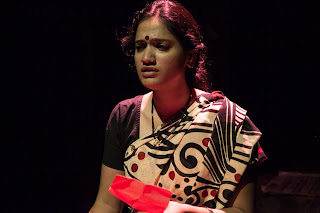In its easiest translation, Sukhan means words. A three-hour long show lauded with Urdu words honestly sounds scary when you first hear of it. I reached the show with some fever in me and after a long tiring day at work, sleep deprived, completely sure that I was helplessly going to doze off right in the beginning. Of course that's far from what happened.
The show began with a soulful rendition of Piyush Mishra's modern day classic Husna. "Popular Urdu songs?" My mind wondered immediately?
The singer in the spotlight was Jaydeep Vaidya, one third of the amazing band Misree. And sure enough, Devendra Bhome on the harmonium and Ketan Pawar on Table were there too! The trio are rockstars in the budding and I hope to spot them making it big soon. My faith in the show suddenly jumped. If nothing else, the next three hours meant listening to them.
Sukhan is a heartwarming mix of Urdu shayari, stories, ghazals, qawwalis and so much more. In essence, it's a throwback to old timey mushairas. It welcomes you warmly and makes sure you stay. Ghalib, Khusro, Meer, Faiz all trickle in and etch a beautiful book on your mind. Now, to be honest, my knowledge of the language and forms is limited. There are a lot of words I miss or fail to understand. But like we're told quite early on in the show, if you can't grasp the words, focus on the sound. Oh and how captivating is the sound with an adept orchestra and chorus!
The show has been curated and directed by the very talented Om Bhutkar. Om Bhutkar also wrote and directed the play Mi... Ghalib, so it's easy to spot his love for the language and literature. He also recites most of the poetry and this is where things get a little confusing. Bhutkar is loud and over-the-top but its hard to decide if that's a bad thing or just a gist of what the olden mushairas must have looked like. He keep calling out a favoured few in the audience, and this makes you feel alienated but his calls become oddly desirable. He fully plays with the fact that he's popular with the audience. He has a raw charm and that works for a while but it also starts to wear off. It takes time to adapt to his broody, quivering voice. But he invests himself completely in his recitation and that itself is a treat to watch. At various points in the show, he almost seems intoxicated. And the voice reminds you of Naseeruddin Shah, so that's a plus.
While you're unsure of what to feel about Bhutkar, Nachiket Devasthale makes quite an impression in contrast. He is sombre, wistful and yet, thoroughly enjoys what he does. There is no drama in the poems he performs and he enchants one and all with his calm telling.
But the real magic hits you when Avanti Patel starts singing. It's a good hour into the show and she barely has three songs. However, if there's one star in the show, it's the young girl. Every time she sings, even if it's just a single line, your heart beats faster (well, mine did). It's a pity the overall number of songs in the show is less, so even fewer come her way.
Sukhan ends too soon. Even after three hours of sitting in the cramped Dinanath, you're left desperate for more. The final qawwali which had people throwing their hats in the sky (they would've if they were wearing any), is a happy consolation.
I left the auditorium utterly mesmerized. When was the last time I felt like this? Oh right, it was after the overnight Natyasattak in Pune. And guess who had managed that night? Bhairavi and Kushal Khot, the managers on Sukhan. The two of them are fast becoming my idols with their solid work in the arts.
The plays hits a political note early in the first half but then mainly sticks to poems of love. However it is entire show itself that makes a strong political statement. And it takes me back to one of favorite poems, penned by Manash Firaq Bhattacharjee:
You can’t write Urdu
On Dilli’s walls, Mian
There’s a saffron lock
On your zuban, Mian
Horsemen of all faith
Plundered Dilli’s rūḥ,
They only blame it on
Your ancestors, Mian
From Bīdel to Ghalib
Run rosaries in Urdu,
They embalm history
With rare attar, Mian
You outlaw a tongue
By policing the wall?
The gardens, the air,
Breathe Urdu, Mian
In the heart of Dilli
Graves speak Urdu,
Even parrots, dusk,
And my jigar, Mian

























